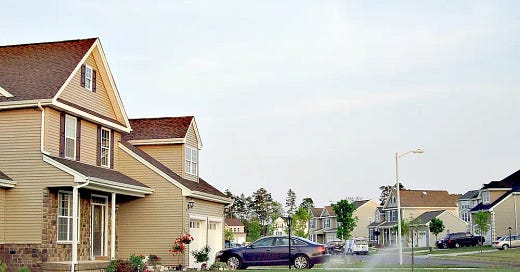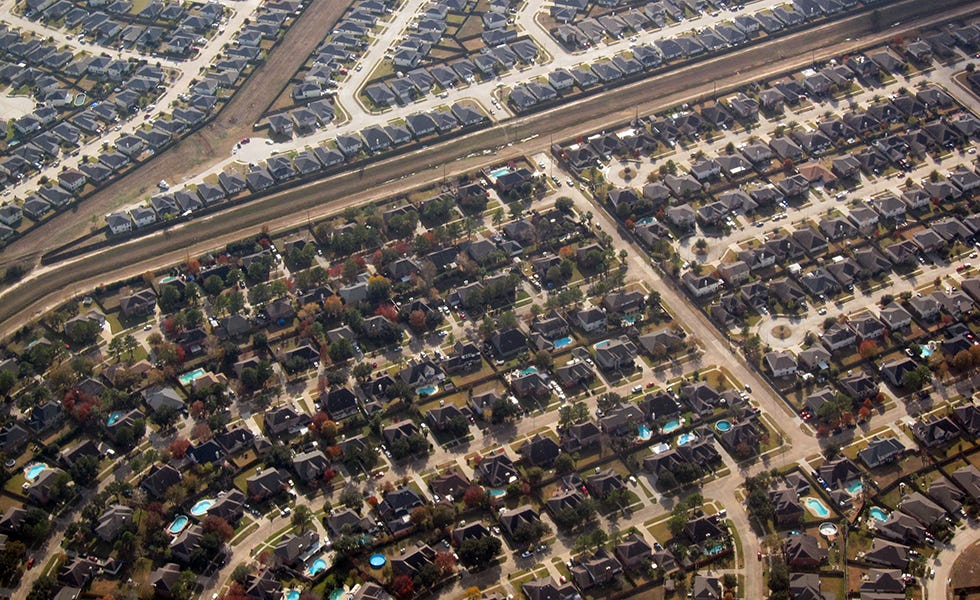The Crippling Isolation of American Suburbs
Here is the type of urban planning that could potentially save us all.
I grew up feeling both repelled and fascinated by American suburbs. It was the bleak sameness, the square lawn, the narrow driveway, the houses duplicated over and over again, like patterns on a chessboard. I was affronted by the nosy authority of Home Owners’ Associations chiding people about their trash bins, the aggressive cheerfulness of our neighbors, their wariness of interlopers that had an unsavory racial tinge to it.
These were things I felt but couldn’t articulate until I was older. I lived with a kind of low-grade horror, figuring it was just me. Again. Nobody else seemed all that bothered by a perfectly manicured lawn. If I brought up the subject of my suburb-induced dread and isolation, all I got for my trouble was a blank stare.
According to a Pew Research Center study conducted in 2018, 55% of Americans live in the suburbs, and that population is growing. This is particularly true for the 65-and-older crowd. Since the year 2000, they have comprised 39% of the suburban demographic. Many of the rest are families.
Rarely is there fast, reliable public transportation out of the suburbs, which leaves entire generations of restless teens marooned in a cultural wasteland, all the more vulnerable to the predations of drugs, violent video games, and online pornography. The nearest grocery store is often a mile or more away, certainly too far to walk to safely, especially since lots have gotten bigger and sidewalks are nonexistent. This leaves two working parents driving long hours in bumper-to-bumper traffic to pay for a house that mostly sits empty, kids with mountains of homework and an over-reliance on fast food because no one has the time or energy to cook, and couples who, after the children are in bed, are too exhausted to do much of anything except stare, zombie-like, at the television.
It’s no surprise then that the Norman Rockwell vibe in some American suburbs hides a grimmer reality. In 2016, suburban communities were found to have the highest “drug overdose fatality rate of any community type” in the US, and that was before the fentanyl epidemic. A rudimentary understanding of human nature explains why. Americans lead obscenely lonely lives. Our closest friends are often virtual, people we interact with via Zoom or on social media. We drive long distances by ourselves in cars or, conversely, we may not drive much at all, working remotely from home and ordering Grubhub.
And none of what I’m saying here is a criticism of suburban dwellers (I was one) or of the decisions we make out of necessity as members of two-parent or single-parent households. We must gnaw the bone that has fallen to our lot. But going forward, there are ways of redesigning our communities that make a lot more sense, are greener and safer and could possibly lead to less social isolation. We bought into the idea that suburbs were “safer” (some of that was, and is, a racist dog whistle), and with better schools. What we failed to ask ourselves is: safer from what?
I never fully understood what our urban planning problems were until I moved to Europe. On the aggregate, Europeans don’t live in three-car McMansions surrounded by moats lawns. There is a lot of communal housing here. Most Italians, for example, live in apartment blocs. In our building alone, there are five other apartments and a communist trattoria downstairs on the opposite side of our Renaissance palazzo. With 60 million Italians crammed into a country that’s half the size of Texas, you’re never more than a few steps from a coffee bar or a grocery store. Even here in poorly served Umbria, we have access to buses that take us to train stations. Just as importantly, there are spaces for young people to congregate that don’t require being driven somewhere in a car.
Last week, a Slovakian Reddit user asked some pointed questions about American neighborhoods. He was baffled, and rightly so, by photos he saw of wasteful, suburban sprawl. “What do you actually do?” he wanted to know. “Are you always stuck inside? What did you do when you were a child and couldn’t drive? These places have back and front yards, but they’re mostly empty. Why don’t you grow plants in your yards, like potatoes, cucumbers, tomatoes or whatever. Why do you own this land if you never use it?”
Those are all good questions. The trouble is, we’re not the ones asking them.
White flight was a gift of unimaginable riches to property developers who then erected whole subdivisions out of Tyvek, cheap brick, and drywall. For a bit extra, you could get a starter tree or maybe your front and back yards sodded. In our quest to get away from people, we created a world of dead “bedroom” communities connected by ferociously sterile highways. What we actually needed was community. Real community, not this Potemkin Village of pills, porn, and despair.
If we must have suburbs, then imagine suburbs done right. Think of a main square cut off to traffic where people are free to shop, chat, and hang out. “Live” streets instead of dead ones. Think of mom-and-pop shops with rent-controlled, affordable business leases and big glass windows where you can see inside: bakeries, hairdressers, grocery stores, post offices. Think of houses that aren’t allowed to exceed certain heights or widths (no more Garage Mahals), generous front porches conducive to socializing with friends and neighbors, garages around back so the whole street isn’t a row of ugly garage doors. Imagine a communal garden and vegetable patch. Imagine sidewalks and xeriscaping instead of environmentally ruinous lawns. Or a park with a terrace for parents to drink coffee while they watch their kids play.
We have that here in Amelia, by the way. During the soccer championships last summer, an outdoor screen was hung between two trees, and everyone came out to watch. According to this Business Insider article, people naturally want to live in places that have well-defined paths, edges, districts, and landmarks, which are precisely the characteristics suburbia lacks.
By accepting a certain amount of structure and regulation (e.g., a main square without cars), life can be better for everyone. Over the last hundred years, we’ve managed to democratize comfort and make beauty something only the rich can afford. But should beauty be the exclusive province of the rich? Isn’t it something we can all create by studying what works, what’s visually pleasing, and then having the testes to do it?
Maybe the U.S. needs to become less of a car culture and more of a pedestrian culture. Fewer parking lots and more bike lanes. Quality of life isn’t something Americans should only start worrying about after a terminal diagnosis. They should worry about it now. We’ve grown numb to the ugliness and isolation of modern life. We barely notice it anymore. Yet there’s some part of our collective soul that yearns for beauty. Consider which cities are groaning under the weight of unsustainable amounts of tourism—at least 90% of those cities were built before 1900.
There was a time in our not-too-distant past when a public building had to have beauty as well as utility. With all that we are capable of accomplishing as humans, is there any reason we can’t reinstate beauty as a priority, too?
Repeat after me: beauty doesn’t belong to the rich. It belongs to all of us. And we can create it when we remember that being too isolated from other people isn’t good for us, no matter how much we may hate them. We prosper when quality of life for everyone is valued over quality of life for the few.
For more information on what makes an attractive, lively city or suburb, watch this quick video. And be sure to leave your thoughts on what your ideal neighborhood might look like in the comments section below. I’ve rolled up my sleeves, and I’m ready to dive in!
Do you know somebody who needs a free subscription to Cappuccino? Sign them up here!
Copyright © 2022 Stacey Eskelin






"It’s no surprise then that the Norman Rockwell vibe in some American suburbs hides a grimmer reality." Indeed, Americans are programmed to not reflect upon alternatives. We don't think about community, which leads us to not knowing our neighbors, which leads to a lack of trust, which leads to crime and violence, etc., etc.
I miss the living experiences I've had overseas, in the sense that there was a much greater sense of community. People were more involved and interested in the lives of their neighbors. Sure, it could border on nosiness, but when someone needed help, people were there for them. And people genuinely cared about what was happening in the lives of their neighbors.
Americans are programmed to be lonely and accept it as the norm. Your Slovakian Reddit user makes a very good point. We have land, but put it to poor use. We have people around us, but never think of creating community. It's no wonder that we've grown to distrust and in some cases revile some of our fellow compatriots.
We lead a very hollow and shallow existence in many ways, yet we almost never consider if there may be a better/different way. Those who do are passed off as "weird" or "odd," as if trying to live a life of meaning and purpose is unusual.
Your life has many trade-offs vis-a-vis living here in the US. Like anything else, it depends on what you value and what you're willing to give up for what you gain. If you're happy, and it certainly sounds as if you are, then you've made the right choice.
And that, my dear, is all that matters. :-)
I'd read Lewis Mumford's "The City in History" some little while before I moved from Los Angeles to San Francisco. But that change made it vividly clear to me that places like L.A., San Jose, Houston, etc, were not cities at all, they were growths.
Oddly enough, growing up in San Diego in the '60's and early '70's, despite living in tract housing in suburbia, there was no lack of places nearby where I could go. There was a lake just 4 blocks down the road from where I lived, and Cowles' Mountain was too rugged at the time to be developed, especially when it was so cheap to continue spreading outwards. (CM was later designated as a park, one that is considerably larger in acreage than NY's Central Park.) When I got a little older I could take a bus that ran all the way to downtown.
Oh, and San Diego also spoiled me because there were adequate side walks everywhere there were streets. It was years before I discovered that some places simply didn't have them. So. IL is especially guilty of that latter.
By the bye, Mumford made the same point as Campbell about looking for the BIG pieces of architecture. Despite the Transamerica tower, in San Francisco it was always the bridges.
I am convinced that the thing that has saved most older cities (at least the one's that have been saved -- London seems determined to go to hell with one rabid, extended assault on any last pretense of decency -- is the geographic and physical limitations to growth. Without such limitations, the introduction of the automobile makes the suburb a possibility.
Sometimes the introduction of the automobile had to be forced upon a place. Thus, GM purchased Los Angeles' very effective public transport system, the red car trains, and deliberately mismanaged it into bankruptcy in order to force people to buy cars. This was all proven in court, where GM was ultimately fined something like $8,000.00 or $9,000.00 for a stunt that would earn them *BILLIONS*. (Folks might recall, this was the underlying conspiracy in the film "Who Framed Roger Rabbit?")